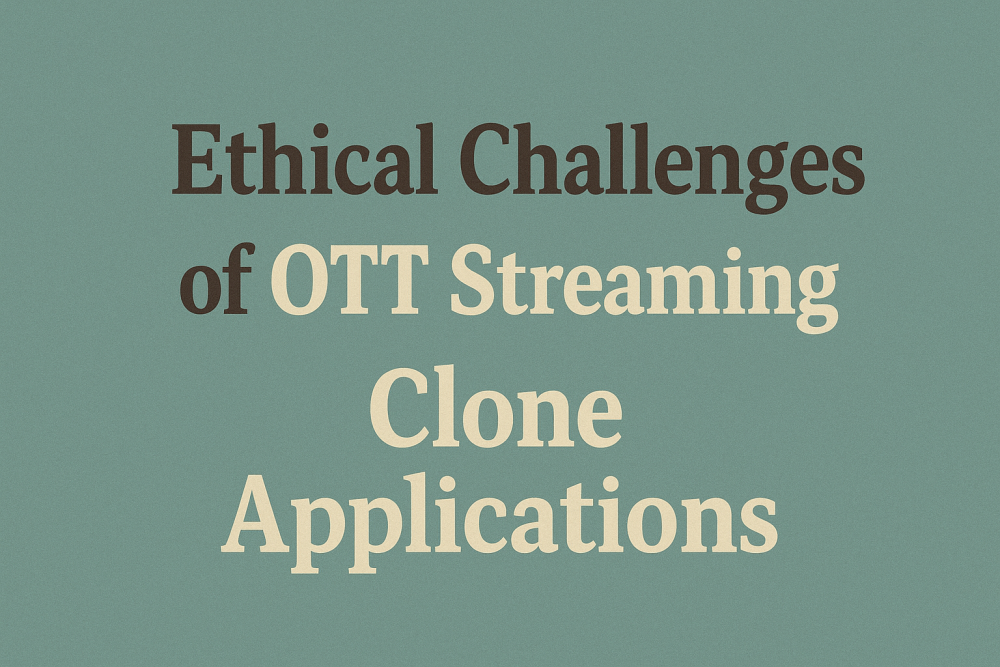It’s astonishing how quickly entertainment has developed, don’t you think. Not too long ago, we were arguing over the TV remote, and now we’re juggling half a dozen streaming subscriptions. With Netflix, Disney+, and Prime Video shaping how we watch content, the rise of OTT streaming clone applications was almost inevitable. These clones basically custom-built versions of popular platforms and give startups a shortcut into the booming entertainment business. But here’s the catch, they also bring along a messy set of ethical challenges that are hard to ignore.
The Fine Line Between Inspiration and Imitation
Let’s get one thing straight that cloning isn’t automatically a bad thing. If anything, it’s a smart move for small developers who can’t afford to reinvent the wheel. But when a clone starts looking too much like the real deal, that’s when eyebrows start raising.
Many OTT clone platforms don’t just borrow ideas; they practically mimic everything from the user interface, recommendation engine, even the “next episode in 5 seconds” feel. Sure, imitation is the sincerest form of flattery, but legally and ethically, it’s walking on thin ice. The question isn’t whether clones are useful, they are, but whether they’re crossing the invisible line between innovation and infringement.
Piracy: The Elephant in the Streaming Room
This is the point where it becomes somewhat uneasy. Some clone apps don’t just replicate the platform; they borrow the content too without permission. You’ll find copyrighted movies and shows available for free streaming and while that might sound like a dream for users, it’s a nightmare for creators.
Piracy isn’t some harmless internet hack but it’s theft, plain and simple. It chips away at the hard work of producers, directors and artists. Imagine putting your heart into creating a series, only to have it pop up on a clone app where someone else profits from it. Yeah, not cool. And let’s be honest if content creators stop getting paid, our binge-worthy weekends would quickly dry up.
User Data: The Silent Casualty
One of the shadiest corners of this discussion is user data privacy. Big OTT players invest heavily in encryption, multi-factor authentication, and compliance laws like GDPR. Clone platforms? Not so much. Many operate with vague privacy policies (if they have one at all), leaving users unaware of how their data’s being used or worse, shared.
Think about it, when you sign up for a clone app, you might be handing over your personal info, credit card details and viewing habits to an unknown server somewhere. It’s kind of like giving your house keys to a stranger because they promise better movie recommendations.
Authenticity and the Content Credibility Crisis
OTT clones often market themselves as “alternatives,” but some end up being content graveyards with a mix of pirated, low-quality or mislabeled videos. Users feel frustrated when they believe they are registering for a genuine platform, only to discover the online version of a counterfeit handbag.
Ethically, transparency should be non-negotiable. If a clone app hosts licensed, independent, or user-generated content, great! But pretending to be a premium platform while cutting corners? That’s deception, not disruption.
Impact on Creators and the Creative Economy
Here’s something we don’t talk about enough: every pirated stream directly affects someone’s paycheck. Writers, voice actors, editors, camera operators all lose out when clone apps skip the legal route. Multiply that by millions of users, and you’re talking about serious economic loss.
And let’s not forget how this feeds into a vicious cycle. The greater the number of clone apps disregarding rights and royalties, the more hesitant creators become in releasing new content. The result is fewer original stories, fewer jobs and a less vibrant creative industry overall. So yeah, ethics in this space matter a lot.
Not All Clones Are Evil, Though
Alright, let’s acknowledge those who deserve it. Not every OTT clone application is a digital villain stroking its virtual mustache. Certain developers truly leverage clone frameworks as a springboard for innovation by incorporating appealing features such as localized content, live chat, or specialized genres that mainstream services overlook.
The true distinction lies in the intention. Replicating to enhance user experience or boost content accessibility is a progression. However, if your goal is to profit from the achievements of established platforms while inadequately rewarding creators, it’s not innovation but exploitation instead.
The Final Scene
The emergence of OTT streaming replica applications demonstrates that the entertainment sector is not decelerating in the near future. But with great tech comes great responsibility (yes, we’re borrowing from Spider-Man here). Piracy, privacy breaches, and plagiarism are the villains of this story and if left unchecked, they can ruin the plot for everyone.
At the end of the day, ethical development isn’t a barrier to success but it’s the backbone of long-term trust. The future of streaming doesn’t belong to those who copy the best; it belongs to those who create better, fairer and safer ways to entertain.
So maybe the moral of the story is simple: stream smart, code honest, and keep creativity in the spotlight exactly where it deserves to be.
